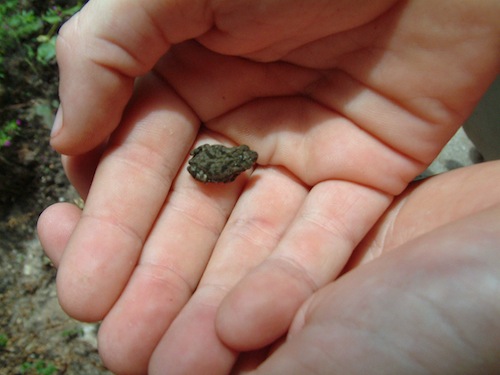A few weeks ago I attended a great event in Portland, Oregon, called Tiny Startup Camp. I went hoping to get some clearer ideas about a product or service I could launch. The “camp” was a great mix of speakers, break-out sessions, and actual time to work on things.
My favorite talk was the kick-off talk by Jason Glaspey. I wrote down a bunch of rough notes that follow. Daniel Bachhuber also posted a good set of detailed notes from Jason’s talk.
Raw Notes From Jason Glaspey’s Talk
Minimum viable product (MVP)–most basic functionality that someone can start using immediately
Why choose Tiny?
- You don’t have to make millions of dollars to be happy
- We have a good quality of life here in Portland and it doesn’t take that much money to live well
- There are so many other options than taking funding and hoping for a big jackpot/cash-out
- Taking funding–someone else gets to decide
- Not tied to someone else’s idea of success
Tiny is an attitude, it’s not just a startup. What’s the smallest, easiest way to test a market? Figure it out.
Figure out what actual needs are versus what people say they want by asking lots of questions
Passive Income
- Mostly a falacy
- “4-hour work week”–Some people are doing it, but not very many
You have to learn to solve little problems and how to solve them on your own–over and over again.
“Success can look very different when you don’t have financial obligations”
“Failing can be really exciting and the best possible outcome”
Don’t be so invested that failing hurts (or wipes you out)
Launch in three weeks!
“What a cool idea to bring a bunch of people together and learn something”
Jason typically spends $1,000 to $2,000 if think it has the potential to make $10,000
Measure the potential of your idea by using analytics:
- Setting up a landing page that looks like you can buy something
- Provide a shopping cart and see how many people attempt to use it
- Add a “buy-now” button that takes people to a page that says, “We’re sorry it’s not ready, but we’ll let you know when it is.”
Passion, willingness/perseverance, and lack of fear
Work on a project that is solving a problem somewhere
Tiny filters—is your idea really “tiny?”
- Pager test–If the site goes down it’s not the end of the world and while people might be upset you don’t have to fix it right away
- not a ball and chain
- Launch quickly–3 or 4 week to launch
- Day 1 Profitability
- Money comes in on the first day
- Self-maintainable
if you can’t do every step of the product, don’t do it–you want to understand how it all works before you hand it off to someone else
Not overly saturated space
There is a clear path to success
Not too much success
Only sell to people with Money
- Bad idea: resume service for people that need jobs, because those people don’t have a lot of money because they don’t have a job
- It doesn’t feel good to take someone’s last $10
Don’t enter a market you can’t be heard in–is someone already the voice of that particular niche?
Strive to make $500 to $1,000/month in four months
Don’t be this guy: ”Create the most addictive, comprehensive, universally accessible, viral, integrated and profitable automobile-related community on the planet”
- this idea is WAY too big
“Don’t confuse a startup idea with a genie wish”
“Solve a single problem, for a group of easily identifiable people, who want a solution and can afford to pay for it.”
Find a product that extends someone’s identity
Good tiny startup ideas
- ebooks
- membership sites
- digital downloads
Bad tiny startup ideas
- iOS Apps
- Global domination
- Advertising based
- Anything you have to hire out
- Acquisition only ideas–instead sell products for money!
Until you are receiving money for something you do not have a product
Manage major pain points by making them medium pain points
”just good enough” is what you’re shooting for–then find the next thing causing the most pain to your customers
Do not strive for perfection
At first, do everything yourself. You need to be involved in every step, then outsource everything you possibly can.
Know when a student is enough, or when you need a professional to do it right
Reference point: Jason pays $400 a month for adwords consultant and spends $4,000 to $5,000 on advertising (this is for a fairly mature product)
Never be afraid to put something on hold or kill it
Become a problem solver
Every time you encounter something annoying think about how you make it better
If the behavior of your microwave drives you crazy, think of how you would make it better
Get over the notion that “that will take time (assumption–too much time) to figure it out”
“Don’t be an ‘’idea guy’’. An idea guy is a stupid guy “
Solve the small problem in the easiest way possible
Find someone that already has “terms of service” and a “privacy policy” and copy theirs (if that’s okay, of course)
Re-occuring Subscriptions
Platforms Jason likes and recommends:
- WooCommerce
- Stripe as backend collections INSTEAD of PayPal (which is horrible for tracking refunds and other stuff)
Allegedly, PayPal gives very information about why a payment didn’t go through so a charge could have failed for any number of reasons and without knowing what the reason it is, it’s really hard to follow up with that person in a personalized way.
Pricing
- Does a lower price and thus “more people to service” add more overhead?
- If “yes” a higher price could be a better way to go
- Hopefully less people at higher price equals same revenue
Surveying
- Surveymonkey
- WooFoo
- Polldaddy
Give something away to entice and thank people for participating in your survey
- It doesn’t have to be a big “giveaway” to generate interest
- Just give away a coffee cup!

